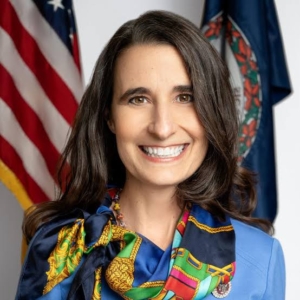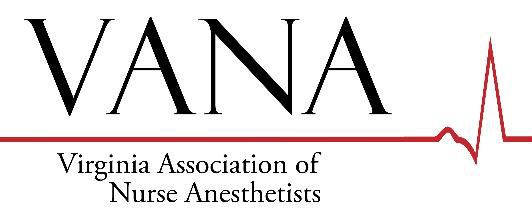Senator Boysko Interview
This month, VANA spoke with State Senator Jennifer Boysko, who represents the 38thSenate District in Virginia in Northern Fairfax County. This is Senator Boysko’s 10th year in the General Assembly, during which she has served three years in the House before moving to the Senate.

Senator Boysko, why were you drawn to public service as a career?
I can most deeply attribute this to my mom. She’s my biggest inspiration. I grew up watching her make choices to support our family, struggling financially, deciding between taking a day off with no pay to take care of me when I was not feeling well or bringing a paycheck home. had the opportunity to go back to college and become a registered nurse, and the rest of my teenage years were a much more stable situation.
She was able to take care of us, cover costs, give us a livable and dignified life. It’s always stuck with me. I know a lot of people in Virginia and around the country struggle with those same kinds of economic challenges, especially single moms. Nurses hold a special place in my heart for the work they do and the people they help. So that’s why I fight for policies around economic policy and to give people tools so they can take care of themselves.
What committees do you serve on?
I serve on five full committees. My current committee assignments include:
- Chair of the Senate Transportation Committee
- Senate Education and Health Committee while also serving as Chair of the Health Professions Subcommittee
- Senate Finance and Appropriations and on the Capital Outlay and Transportation Subcommittee and the Health and Human Resources Subcommittee
- the Courts of Justice Committee
- and the Rules Committee.
Last year, I was assigned as one of the conferees for the state budget.
What do you consider to be your biggest legislative accomplishment?
That’s a big question!
So many of these things, like Medicaid expansion and getting paid family medical leave through the House and the Senate last year, were hugely important even though they were vetoed by the Governor.
Policy has the ability to change people’s lives, to allow them to have the dignity to care for themselves and their loved ones and not have to worry about losing their jobs. Not enough people have that option.
I’ve been working on different aspects of equal pay for equal work because our existing equal pay law was passed in 1973 and needs to be updated. Paid Family Medical Leave is my second major priority – it’s beyond time we make progress on that issue. Additionally, I’m carrying the constitutional amendment to enshrine the Fundamental Right to Reproductive Freedom, SJ 247 in our Constitution, and I’m the chief co-patron on the Marriage Equality Constitutional Amendment, SJ 249. We have a lot of incredible work coming up this year.
And I can’t leave out freeing the 3,000 beagles from Envigo! That was a major highlight for me.
What do you think the most pressing issues facing Virginia’s medical professionals are?
We do not have enough mental or physical health professionals here to serve our community. I’ve been working with nurses over the past several years to try to give them more parity on independent practice.
What I would like to see is that in every corner of the Commonwealth, people have a quality health care professional who is there to take care of them, whether it is a medical doctor, a nurse practitioner, an advanced practice nurse, to have that care for them.
And don’t have enough forensic nurses around the Commonwealth, and I’ve been working on that for several years. You hear heartbreaking stories about students who are faced with a devastating situation and don’t have a way to get to a caretaker, a forensic nurse who leaves them with some dignity.
And we have community groups who require waivers within our system, but don’t have enough medical professionals available to care for them. So, whether it’s nursing aids or home health care workers, mental health professionals, we have a long way to go supporting all the needs of every group of people within our community.
But, as the chair of the health professions subcommittee, I’ve had a seat at the table to really hear these issues and try to understand the challenges around them. We’ll continue working on them. Especially for nurses and our professional caretakers who are highly trained, skilled, and should be able to practice at the highest scope of their training.
Do have any advice for VANA members around getting involved in the General Assembly?
Yes! Coming to visit us is always helpful. We need to understand the challenges around your issue and how we can get to solutions, so when someone isn’t convinced of a policy we can start to address those challenges and find a compromise or a way to move in the right direction.
Quite often we hear, “This is too hard, not practical” etc. I always challenge that by asking about what would work. Let’s find bridge builders who are willing to be part of a conversation with people who may not agree with them to find some point of agreement and collaboration. We may not get there all at once, but we can take one step at a time and make progress.
Additionally, communicating with legislators by sharing stories is always incredibly powerful.
What can CRNAs do in Virginia to support other health professional issues that are important to you?
Coming and testifying, showing support for the different pieces of legislation and again, having those conversations with legislators who might be skeptical or not understand the full scope of what CRNAs can do would be helpful.
One challenge with some of my colleagues is that some have a level of fear that there might be substandard care with the exclusion of a medical doctor. So helping people understand that CRNAs and advanced practice nurses have so many licensed skills and are practicing independently in other parts of the country and can show success stories – this will help.
Is there anything else you’d like to share about CRNAs with VANA?
This issue is so personally important to me. One of my own children was born premature in 1997, and our family stayed in the NICU for six weeks. This was an emergency situation, and the care team who provided our care were essential lifesavers, in addition to providing some much-needed kindness. The support they demonstrated during that time has stayed with me for all these years. They are an essential part of our health care system, and they should be supported, valued, and recognized for the incredible work they do every single day.
My story has driven my passion for improving Virginia’s healthcare landscape, it is not unique to just my family. Thousands of families across the Commonwealth turn to medical professionals each day, and providing them with safe, reliable CRNAs who can practice to the fullest extent of their licensure is incredibly important to me.

